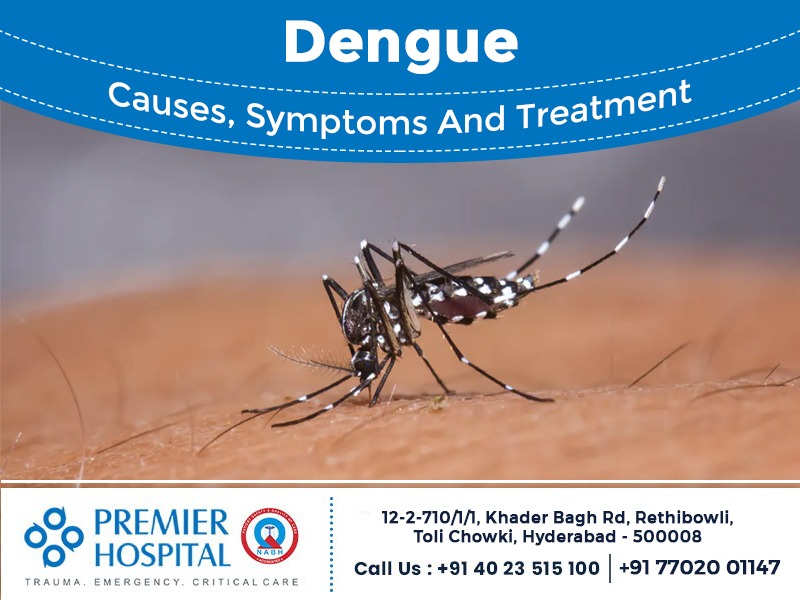Dengue Causes, Symptoms and Treatment
by Premier Hospitals | September 18, 2021 |
What is dengue? Dengue is a fever caused by one of the four dengue viruses and it is transmitted by the female mosquito species Aedes aegypti and Aedes albopictus. Dengue is more common in tropical and subtropical regions which are spread in more than 100 countries. An individual with mild dengue fever will have flu-like symptoms and a high fever. When the disease is severe, it is called dengue hemorrhagic fever and it has the ability to cause bleeding, an abrupt drop in blood pressure and death. This viral fever is seasonal, as the dengue cases tend to increase in certain climatic conditions. What are the causes of dengue? When a mosquito bites an infected person, the virus infects the mosquito. first. When this infected mosquito bites a healthy person the dengue virus enters into the bloodstream and causes infection. Dengue cannot be transmitted from one person to another. These mosquitoes breed in muddy stagnant ponds. One bite of a mosquito is enough for a person to get infected with the virus and to fall sick for days. Only certain species of mosquito carry the infection. These mosquitoes are mostly seen during the daytime because they become active approximately two hours before sunrise and stay active until sunset. Their bites are very aggressive during the daytime. The dengue virus shows its effects after four days of a mosquito bite. It can be diagnosed through blood tests. Following recovery from dengue fever, your body is protected from the type of virus you were infected with; you are not immune to the other type of dengue viruses. In other words, you are susceptible to infection caused by the other three types of viruses in the future. The risk of severe dengue fever increases if you get infected with the dengue virus again and again. What are the symptoms of dengue? The symptoms of a dengue infection often do not appear for a long time in the beginning. It is possible that symptoms may be mistaken for other diseases like the flu and usually, they begin around four to ten days after a mosquito bite. An individual with dengue fever will experience high fever (104 F (40 C)) and the following symptoms:- Headaches
- Abdominal pain
- Nausea and continued vomiting
- Severe joint and muscle pain
- Pain behind the eyes
- Skin rashes
- Severe joint and muscle painÂ
- High fever
- Damage to the lymph nodes and blood vessels
- Mild bleeding from the nose & gums
- Enlargement of the liver
- Internal bleeding
- Failure of the circulatory system
- Weak pulse
- A drop in blood platelets
- Stomach pain
- Small blood spots under the skin
- Cleaning the stagnant water in your surroundings, it is the breeding place for mosquitoes
- Cover the windows and doors with nets.Â
- Use mosquito repellents
- Apply mosquito repellent creams
- Wear protective clothing





